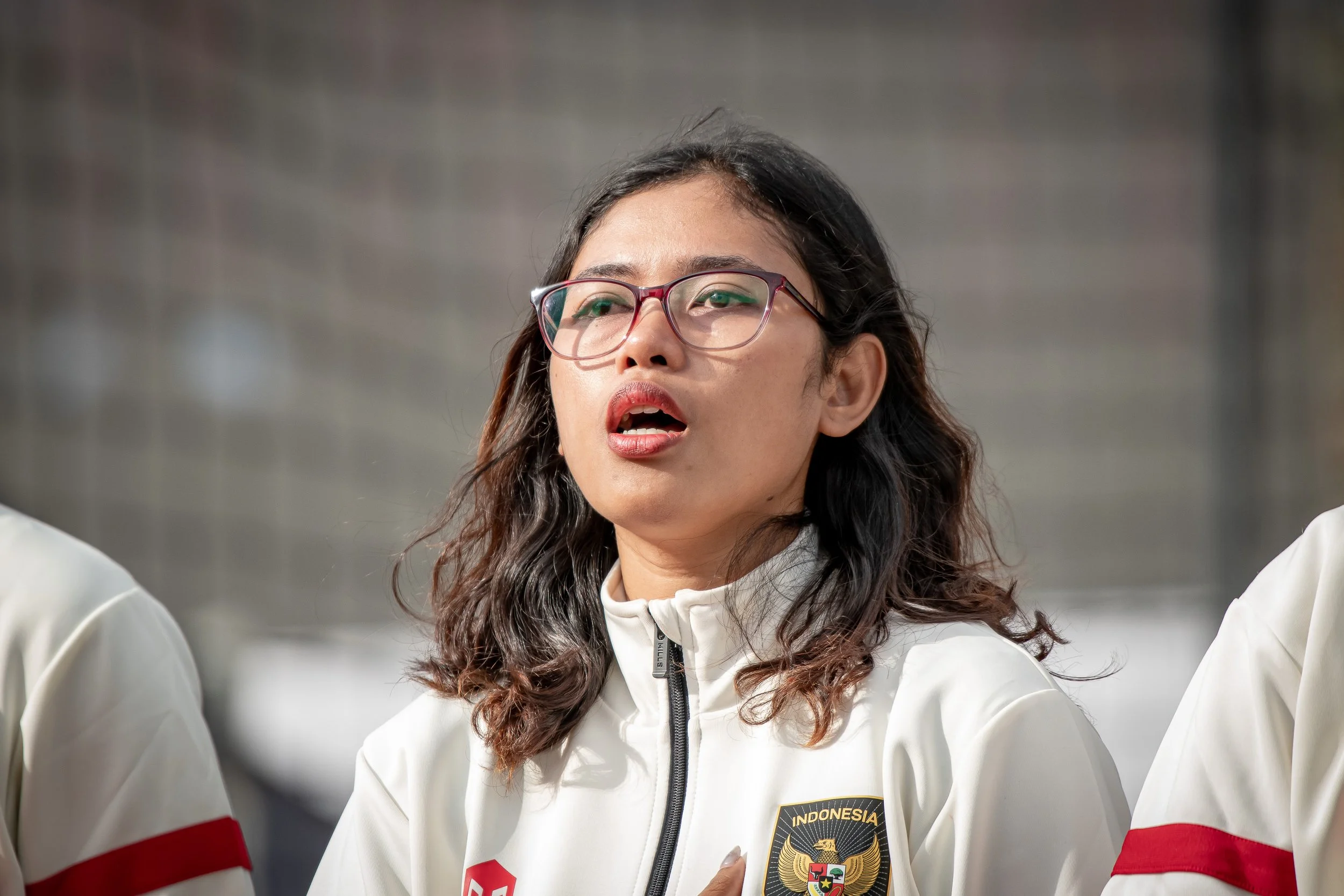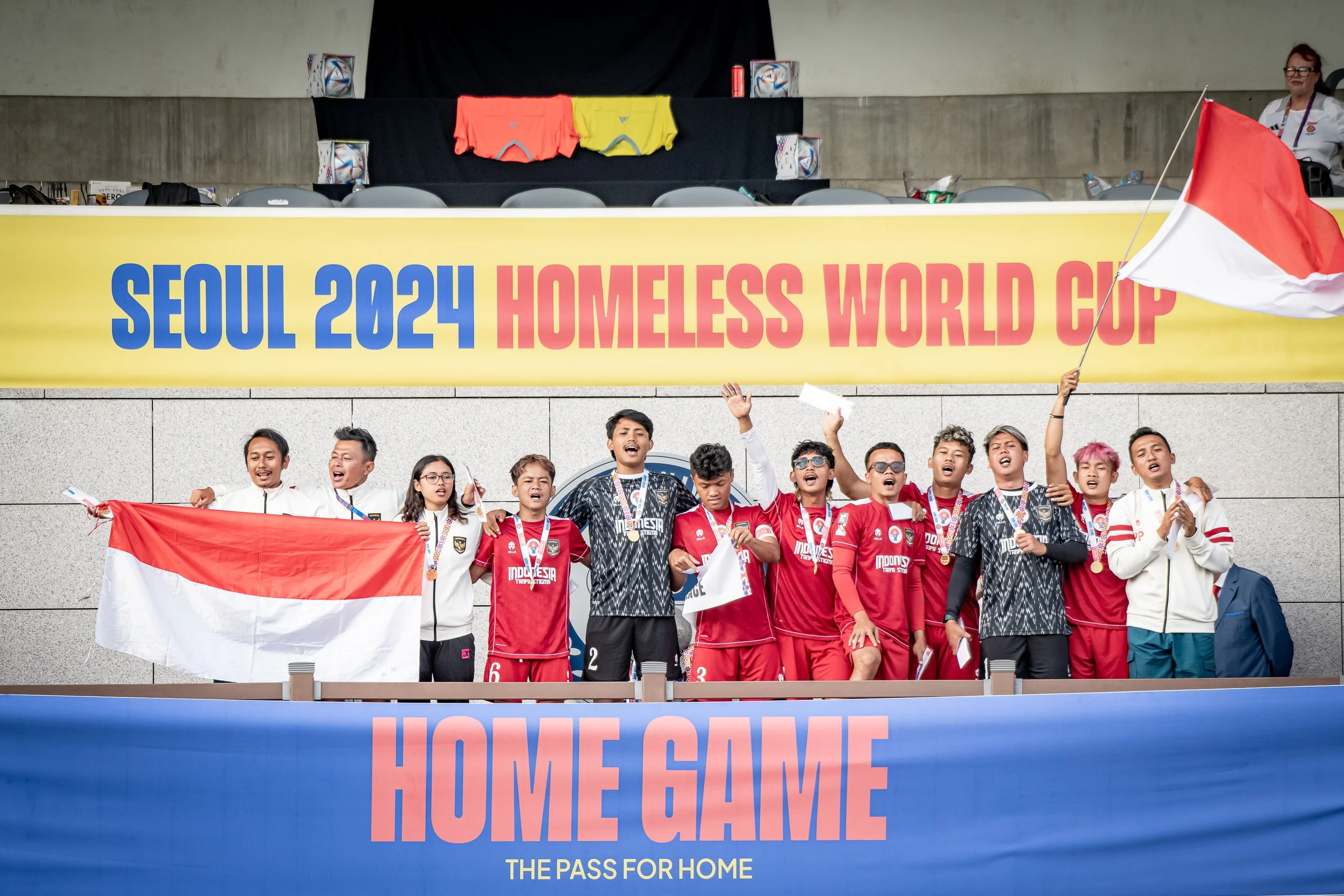Breaking Barriers in Football
Rin Aulia at the Seoul 2024 Homeless World Cup where she managed the Indonesia team who secured their highest tournament finish since 2012 by finishing 4th
In Indonesia, football is often perceived as a masculine sport, and women working in managerial roles within the game frequently face scepticism about their ability and competence. However, behind the scenes of the Indonesian Homeless World Cup team, several remarkable women have played key roles in leading and managing the squad on the global stage.
Indonesia has a history of female managers in the Homeless World Cup, proving that leadership in football is not limited by gender. Kate Otto led the team at the Paris 2011 Homeless World Cup, followed by Kheista Leonie at the 2013 Poznan Homeless World Cup, Gina Afriani at the Cardiff 2019 Homeless World Cup, and Rin Aulia, who has managed the team at both the Sacramento 2023 Homeless World Cup and the most recent tournament, the Seoul 2024 Homeless World Cup.
Their contributions have been instrumental in shaping the team’s journey, from organizing training camps to ensuring the players are mentally and physically prepared for the competition. Despite working in an environment that often underestimates women’s capabilities in football management, these leaders have demonstrated resilience, passion, and dedication.
To mark International Day of Sport for Development and Peace, the Homeless World Cup Foundations wants to recognise the achievements of our Indonesian Member Country so we sat down with Rin Aulia to talk about her journey, the challenges she faces, and her hopes for peace, unity and women in football.
Q: How did you become the manager of the Indonesian Homeless World Cup team?
To be honest, I wasn’t originally supposed to be the manager. I stepped in to replace someone else, and it all happened just three months before the 2023 Sacramento Homeless World Cup. That was the first tournament after COVID-19, and at that time, Indonesia’s participation was still uncertain due to funding limitations. The team was in limbo—no one knew if we could even go.
When I was asked to take over, the first thing I did was look for support just to get jerseys—because at that point, we didn’t even have any kit. Fortunately, a former Homeless World Cup player stepped up to help us. Financially, we had zero budget—we couldn’t even afford to rent a training field. On top of that, staffing at Rumah Cemara had been drastically reduced post-pandemic, which meant I had to take on multiple roles. (In previous years, the manager could focus on leading the team.)
I cried so many times, wondering, Can I really get these players to the U.S.? But somehow, we did it. And not only did we make it, but we also brought home the Lassen Peak Award and the Best Coach Award. It was one of the most emotional and rewarding moments of my life.
Q: Football management is often seen as a man's job. Have you faced any challenges as a female manager?
Absolutely. There’s still this perception that women aren’t as capable when it comes to leading a football team. People often assume that only men understand. I’ve had to work twice as hard to prove that gender doesn’t define ability. Fortunately, I’ve had strong support from my team and organization (Rumah Cemara), which has helped me push past those barriers.
Indonesia and USA take part in a Homeless World Cup tradition at the Sacramento tournament - after each game they join hands and run to the crowd as one team
Q: Have you ever faced criticism or scepticism about your ability as a team manager?
Oh, definitely. I remember someone saying, "There are so many men who are more competent, why does it have to be Rin?"
It was frustrating, not just because of the comments, but because some of them came from fellow women. That’s what disappointed me the most. I would expect to be doubted by men, but when women themselves underestimate other women, it feels even more discouraging. Still, I used all of that as motivation. I wanted to prove that I was not only capable but also deserving of the role.
Q: What are some of your proudest moments as the team’s manager?
Seeing the players grow, both on and off the field, is what makes this job rewarding. Many of them come from difficult backgrounds, and football becomes a turning point in their lives. One of my proudest moments was during the tournament in Sacramento when our team, despite all the odds, showed incredible teamwork and resilience. Watching them represent Indonesia with pride is something I’ll never forget.
And then, in 2024, we made history again.
Indonesia finished in 4th place in Seoul, our highest finish since 2012. It was an emotional moment for all of us because it proved that, even with all the challenges we face, Indonesian players have the talent and determination to compete at the highest level. Seeing them stand among the world’s best was a reminder of why we do this work—to give these players the opportunity to shine and change their lives through football.
Q: What has been the biggest lesson you’ve learned from managing the team?
That leadership is about adaptability. Things rarely go as planned, and as a manager, you have to be ready to solve problems on the go. Whether it’s logistics or unexpected challenges, you need to stay calm and focused. Another big lesson is that leadership isn’t about doing everything alone—it’s about building a strong support system and trusting your team.



